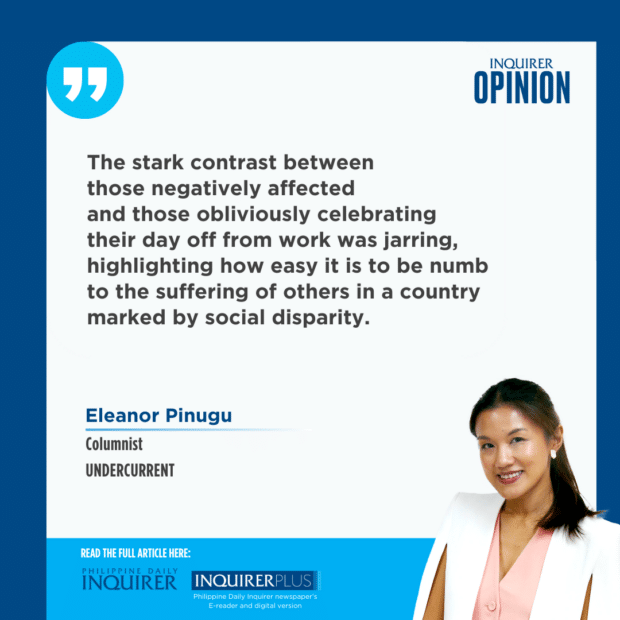Please pause for empathy

It can be challenging to recognize one’s privilege. In “Parasite,” Bong Joon-ho’s award-winning 2019 film about poverty and social stratification, there is a scene where the affluent wife expresses her gratitude for the previous day’s heavy rains for clearing away all the pollution. What she didn’t know was that the storm had caused flooding in her driver’s house, leaving him and his family with nothing but the clothes on their back.
Last week, this movie scene resurfaced on social media as a way for some online users to call out people who were callously flaunting their privilege in the wake of Supertyphoon “Carina.” Between news articles of flooded areas and calls for rescue, there were also posts from people excited to use their “free day” to perfect their golf swings and tennis strokes. The stark contrast between those negatively affected and those obliviously celebrating their day off from work was jarring, highlighting how easy it is to be numb to the suffering of others in a country marked by social disparity.
Desensitization is the diminished emotional response due to repeated exposure to a stimulus. In the Philippines, we are continually exposed to the harsh realities of poverty and the excessive displays of wealth. One does not have to work in the development sector to catch a glimpse of poverty in the day-to-day, and these encounters could become so commonplace that some people may stop “seeing” them altogether. Similarly, social media constantly exposes us to the lifestyles of wealthy Filipinos, from the designer wardrobes of local officials during the State of the Nation Address to the lavish travels of celebrities and influencers. These displays of affluence and status become aspirational for many, potentially distorting their perception of what is expected and attainable.
Article continues after this advertisementNatural disasters further exacerbate existing wealth inequalities. Those from high-income households often possess enough disposable income to bounce back quickly, while those with fewer resources struggle to meet basic needs. Research also indicates that people with higher education levels find ways to gain more wealth post-disaster. In contrast, low-income households continue to experience significant losses due to damages to their sources of livelihood. For instance, a wealthy individual whose car was damaged in the flood can afford a replacement. However, for a Grab driver still paying off his vehicle, suddenly losing the means to earn a living represents a financial challenge that could be quite difficult to recover from. In a more connected world, victims of natural disasters should no longer remain as abstract statistics but as real-life people whose experiences we can easily see and read about online. Increased awareness about the disproportionate impact of natural disasters comes with certain accountability and pausing for empathy can help guide our actions in navigating the aftermath.
1. Do not trivialize the situation. One socialite received a lot of online hate for telling her daughter that it was okay to wear floaties and wade in the flood. Some commenters asked why her post was unacceptable when there were so many TikTok videos of people swimming in flooded streets or treating their flooded homes as “indoor pools.” The difference, however, is significant: People affected by a natural disaster may choose to cope by making light of their dire situation, but a privileged influencer using her novel experience for content is problematic because it trivializes others’ hardships and shows a lack of empathy and understanding. Living in an area with the constant threat of flooding should not be normalized, and those of us fortunate enough to be spared should help shed light on the gravity of this issue rather than minimize it.
2. It is not business as usual. Employers should be prepared and willing to respond to increased requests for leave and accommodation from affected employees. Concerns about productivity loss should be tempered with the understanding that employees who immediately go back to work are unlikely to be effective until they have a better handle on their personal situation. In the long run, people who feel supported and valued during difficult times are likely to exhibit enhanced morale and stronger dedication to the company.
Article continues after this advertisement3. Use your platform for education, not self-promotion. Using a disaster as an opportunity for personal promotion or brand visibility is tasteless and detracts from the communal focus on recovery efforts. It also raises ethical concerns about exploiting other people’s misfortune for personal gain. Instead, our priority should be contributing to a more informed and united response to the crisis by sharing critical updates, combating misinformation, and scaling up the reach of relief operations.
Disasters bring loss and disruption, but the swift response from private citizens during these moments also reveals the potential for a world where solidarity transcends social differences. Empathy unites us toward greater compassion and understanding. We must all strive to develop and nurture this powerful trait within ourselves.
eleanor@shetalksasia.com
















